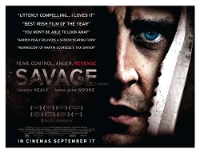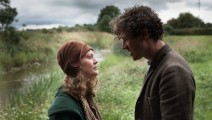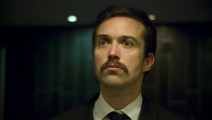feature: Interview with Brendan Muldowney (Savage, 2010)
No Comment It’s two days before Savage is finally going on general release in Ireland and I’m meeting writer/director Brendan Muldowney for half an hour to talk about why he made the film, what he’s trying to say and how he feels about all the interest now about a film that debuted over a year ago.
It’s two days before Savage is finally going on general release in Ireland and I’m meeting writer/director Brendan Muldowney for half an hour to talk about why he made the film, what he’s trying to say and how he feels about all the interest now about a film that debuted over a year ago.
I was fortunate enough to catch Savage at it’s gala screening in Cineworld and so far in Ireland the response seems to be very positive, but Brendan seems a little nervous about his first feature film going out to the public…
NT: The film debuted a good while ago now…
BM: It debuted in Galway in 2009. I suppose it is a long time but when you have a film like ours, with no sales agent, nobody involved from the start – and we didn’t have a major success at foreign festivals or anything, if that had happened it might have speeded things up. So it takes a really long time to finalise a sales agent for the world and then even longer to get a distributor for the UK and Ireland and then, because they’re English, they couldn’t access Film Board money, it’s a complicated thing to get distributed here so it just took time.
NT: It must feel like it’s been over, but it’s coming anew again?
BM: Yeah, it’s weird because I finished making the film and all the creative decisions in 2009 and now we’re nearing the end of 2010 and I’m having to remember it all again; you have to bring yourself back to it to do things like an interview like this. So it’s a strange one I suppose, but it’s good because I’m actually clearer minded now. The only thing I will say is that I can’t watch it any more, and that’s only happened recently. I couldn’t watch the last screening, the one you went to. Finally I’d had enough. It’s too painful, I notice all the mistakes and I’m actually feeling like as if, I’m just imagining the audience and I’m trying to put myself in everyone’s head and it’s just too much for me.
NT: Have you been surprised at the reaction so far?
BM: Yeah I have actually… Well, when we were in Galway (Film Fleadh 2009) the different reactions ranged from, someone fainted, someone was screaming and shouting behind myself and Conor (Conor Barry, the producer) – and he would have seen us go up and the start and then come back and sit in those seats – the reactions ranged from some people who hate it to people who really like it to people who faint so there’s a lot of different reactions.
After Galway we got one review on the net and it happened to be the biggest one, all over the net and as the first review we really got… it wasn’t a great review. So… in a way, you’re very fragile as a film-maker, you’re not sure and even though you’re proud of it yourself, you’re not sure. But you know if you’ve made a dud and I never thought I’d made a dud. Possibly I knew there were some weak parts and maybe the subject matter was enough to really turn people off and focus on the weak parts or something, maybe that’s what it was. So basically. I was damaged. I was like an abused child after that first review…
… So in a way I wasn’t expecting, well put it this way, (with the film going on general release) I was prepared for a balance. If you get a lot of reviews there’s going to be those who like it and people who don’t and it’ll be balanced… but so far, thankfully, even the people who are not as hot on it still appreciate it. It’s not as if they’re saying it’s a mess or anything so I suppose in a way myself and Conor feel vindicated, because we felt all along we were proud of it, so in a way, we’re pleased more than anything.
NT: So, the usual, inspirations? Influences?
BM: Well, there’s three major things. There was a case in New York called the “Subway Vigilante”. A guy called Bernard Goetz in 1984 was on a subway train was approached by some guys who said, “Give us a fiver” or “Give us five dollars”, and he stood up and shot them all, speed shooting it’s called, he shot them all within seconds. He had actually decided in his head on a plan of who he was shooting first and he had them all down within seconds. It transpired that Goetz had been robbed before, mugged before and had taken to carrying a gun and had brandished it once before so he was definitely someone who wasn’t going to be messed with again. So it was one of those grey areas of, is this self defence or is this guy really angry?
Then there was a case in England a couple of years ago, a guy called Tony Martin was a farmer who shot a burgler and also a thing happened here in Ireland. There was a guy called Padraig Nally, a farmer who had been robbed before and had taken to sitting in his shed with a shot gun. Two travellers came in and they were round the back of his house (trespassing) or something and he came out and shot at them, they claim they were trying to sell him a car or buy a car but he shot one of them, killed one of them actually.
So that would have been it, that idea of self-defence taking the law into your own hands… which would have also fed into; I’d also be very interested in vigilante films, revenge films. The first sort of revenge film I could remember seeing was a film called The Exterminator which, if I watched it now I’d probably think it was appalling crap but you know, it was famous at the time and especially when they’re so notorious when we were younger and everyone was talking about it – “there’s this mince meat scene” – of course as kids, you just want to see this.
So I would have gone from those like, exploitation films, then as I got older I would have obviously seen films like Taxi Driver and Straw Dogs then as I went to film school I would have seen films like A Short Film About Killing and Haneke’s Funny Games… then a couple of years ago I came across Gaspar Noé and I saw his first film I Stand Alone, which I thought was amazing, and then I saw Irréversible obviously as well.
Then the final influence would have been, years ago in the North of Ireland there was an instance when two soldiers drove into an IRA funeral. Don’t know what happened, whether it was a mistake or what, but the whole crowd turned on them, they fired a shot, they weren’t dressed as soldier, they were plain clothed, but the crowd just jumped on the car. It was really frightening to watch and pulled them out of the car. The next day then there were photographs of the two bodies, beaten and bloodied, they were just in their y-fronts and they had been executed, beaten then executed.
It was actually very shocking for me, and I’m sure for a lot of people in the country, there were lots of instances in the North but this one for some reason had a really shocking effect on me. I felt very sad or heartbroken or something, I just felt a little, something snapped basically, and that never left me. That feeling. The first short film I made even was trying to reference that feeling, rather than trying to discuss the rights and wrongs of what happened there. Just that feeling I felt. So my very first short film in college was about that incident, not trying to recreate it but it was influenced and I suppose it’s been with me a long time and it’s interesting that my first feature film is along the same thing.
Also, even recently there’s been a lot of beheadings, it’s become very popular to put them on the internet, whether it’s in Iraq or Chechnya or wherever. And really, without seeing them, when I knew they were happening when it was on the news – you might see start of it, you might see some poor guy on his knees and with people chanting behind him – and you feel something, like a shiver goes up through you when you see this sort of thing. That’s again is an influence. That horrifying thing that humans can be, can do this, but that it happens and I’m sad for the victims, I’m sad for the people who do it.
So I suppose that’s my three. And also the book The Wasp Factory, without giving any spoilers away, was when I got an idea of how to give a slant to my attack.
NT: You mentioned it there, right and wrong? In Savage I suppose it’s very much to make your own mind up, is that what you wanted to put there?
BM: Yeah… No, it is. How do I explain. The thing is, I probably do have certain politics in my mind, and certain principles and morals. But number one, I think it’s dangerous to shove your own principles, morals and politics in a film but second… my principles, morals and politics change. Some day I feel one way, some day I feel another. How I explain to people is that; I can get really annoyed when I’m crossing the road and a car is rude and beeps the horn, Im annoyed, I’m like f–k you, but then the next day I’m in the car beeping and it’s like no, hang on. It’s trying to see both sides of things. Like, for example, those beheadings in Iraq. I can see it from the victim’s point of view. This is horrible, This is monsterous, but I also see the other point of view. They’ve been raped, their country has been raped and they’re going to stand up and they’re going to do things. How do people get pushed to that place where they become that inhuman monster of violence? There’s two sides is really what I’m saying and I can’t, I’m not intelligent enough and it’s not my right to go which is right or wrong. Well, sometimes you have to, but in a film, discussing something I think you’re allowed to let people think about it. In real life you obviously have to make decisions about right and wrong.
NT: You’re talking about Iraq and New York but obviously, this is set in Dublin, did you want this to be a universal or a Dublin story?
BM: Well ok, I suppose it’s just a story, it’s a story about violence and whatever but it just so happens that I live in Dublin and I live in the city centre so it’s what I know and it’s the city I know. It’s not that I’m hiding from it being Dublin and it’s not that I wanted it to be any other city but, wasn’t like I was going as I wrote the script – What’s unique to Dublin? It is what’s truthful to me, like, there’s a lot of sirens, there’s always a lot of drunken people shouting at night. I’ve got used to it now but you can wake up and you’ll hear screaming and fighting and you’ll look outside and see some awful behaviour.
I’ve described it that it’s basically the Dublin my character sees. It’s his Dublin. Whereas the guy who comes to fix his locks, his Dublin’s probably far nicer. He’s probably one of those people enjoying himself in the city at night at the start, whereas for my character it’s a lot more threatening, especially after his attack. It’s Dublin as we see it through him, we see the whole film through his eyes and that’s why Dublin is portrayed the way it is.
NT: I was watching some of your short films and I wanted to ask, you don’t seem to be tied to a genre, is there a theme or something?
BM: Well, I have a soft spot for horror films, not silly ones, but something like The Ten Steps, (Muldowney’s multi award winning short film) which is about good old fashioned scares. Genres? No, but I am interested in challenging films, so I probably would… I like watching all types of films but what really got me into film-making, what really made me go “This is what I want to do” would have been watching things like… well I’m only thinking of films I’ve seen since I got into it but films like Gasper Noé’s, like Michael Haneke’s, things that really challenge you and that might not be easy viewing… so that’s more or less what I’d gravitate to. I suppose it’s kind of a theme – challenging films.
NT: Future plans? I believe you’re adapting a Japanese novel?
BM: Well ok, how do I talk about that one? Yes, a Japanese novel called In Love With The Dead. Well, Fastnet Films who made Kisses approached me and Conor about 3 or 4 years ago with a treatment they had picked up in Cannes. It was by a guy who had written the novelisations of Oldboy and The Grudge and he had written some features film and novels himself so he was like respectable enough.
The story, as they pitched it to us, err, “It’s about necrophilia” but they said “Read it though, see if you’re interested”. So me and Conor both read it and I would have different tastes to Conor and when we argree then we both know there’s something to it. So we both read it and we thought “Yeah it’s actually good, it’s not completely exploitation”. So, we took it on and I’ve adapted it now, we’ve tried to… not tone it down but where it does become exploitation we’ve tried to tone it down but still deal with the subject matter, of a lonely suicidal man can’t find love but starts to find love. The thing is, it ends up as a love story, he wants to love a real live woman. On the surface it sounds so dark but it’s got 10 times more heart than Savage, Savage is a relentless film, Love Eternal is actually quite sweet. Well, put it this way, it’s sweet compared to Savage!
So I’m actually looking forward that we’re going to go ahead next year with that, we still trying to finance it, we do have support from the Film Board but we need to close the financing. So we’re going to go ahead and set a date for may next year to start shooting, so we’d be in pre-production from I don’t know, hopefully March.
NT: Is that something that’ll be bigger budget?
BM: Yeah we’ll definitely have a bigger budget, it may not be a huge budget, the subject matter is very difficult so it’s not making it easy. It’ll still be a bigger budget, it may still be a struggle like Savage but the difference this time is maybe everyone who works on it and the companies who supplied equipment and facilities will be paid properly, but I’ll still be struggling with time and constraints.
Savage is an 18 cert film and is currently on general release. This week it is screening in Movies@Dundrum, Cineworld, IMC Dun Laoghaire, Light House Cinema, Santry Omniplex, The Screen, Swan Cinemas, Vue Liffey Valley, UCI Blanchardstown and UCI Coolock.




No Comments